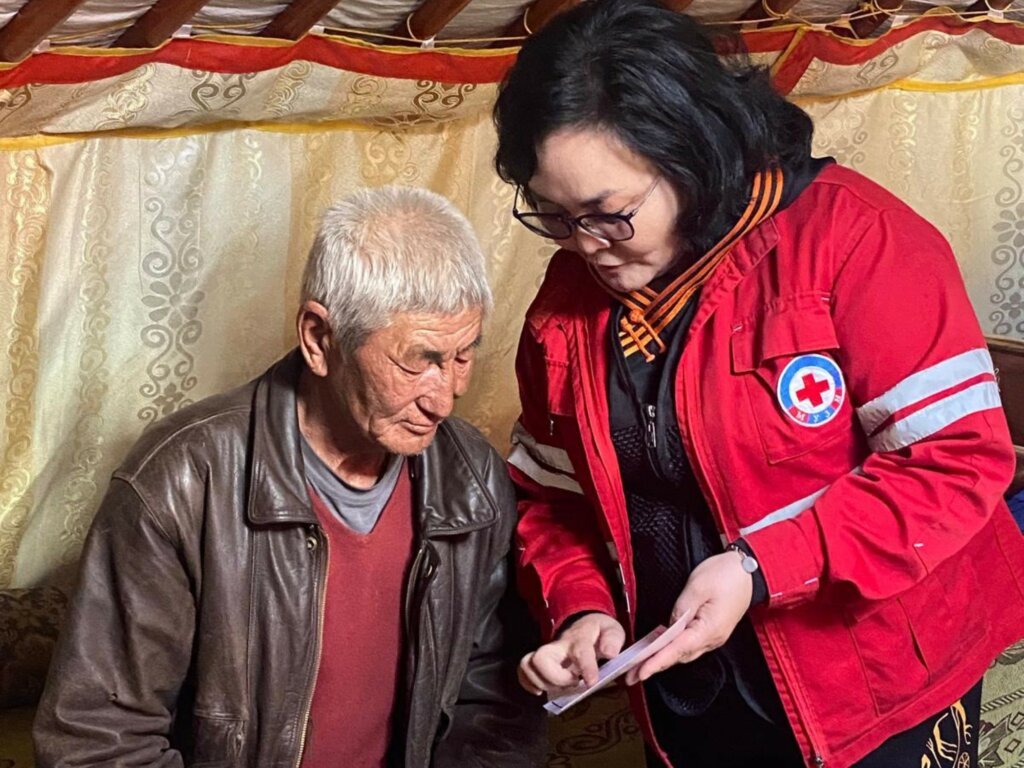
Starting in late 2023, Mongolia experienced one of its harshest winters in nearly a century. As a result, a widespread dzud — a compound hazard encompassing heavy snowfall, extreme cold, and windstorms — created treacherous living conditions for the livestock of herder communities across the country, leading to profound socioeconomic challenges. Integrating elements of Community Engagement and Accountability (CEA) is vital in emergency settings such as this one, as it ensures that aid is tailored to the needs of affected communities. In response to this slow-onset disaster, our CEA Advisor Jonath Lijftogt was deployed to Mongolia with the International Federation of Red Cross and Red Crescent Societies (IFRC) to assist the Mongolian Red Cross Society with supporting herder families through this period and beyond.
“Integrating a CEA system into an emergency response operation from day one helps us to better serve people affected as it allows us to modify or amplify our interventions, improving trust and perceptions in the communities. Such enhanced trust helps National Societies to be stronger local humanitarian actors.”
Manish Tewani, Operations Manager at IFRC
Addressing needs amid compounding risks
Upon Jonath’s arrival in Ulaanbaatar in April, the dzud had already ravaged the rural regions. The snow had melted and refrozen multiple times, trapping grass beneath layers of ice and making it inaccessible for livestock to feed on. As spring approached, those animals that had survived the brutal winter were frail and unable to access the fresh grass that had only just begun to grow. These unpredictable weather conditions left herder families in Mongolia, who often live in remote areas and almost exclusively rely on their livestock for income and food, in desperate need of support.

The response was primarily focused on supporting herder families with fewer than 400 animals and no additional sources of income. The Mongolian Red Cross Society, in collaboration with the IFRC, distributed animal care kits, cash and food packages to herder families to address their immediate needs. The Mongolian government provided hay and fodder to sustain the surviving animals, and cleared roads blocked by snow. To mitigate the psychological impact caused by the dzud, manifesting itself in depression, stress and negative coping mechanisms, psychosocial support was an integral part of the emergency response.
CEA: bringing communities into the response
Jonath’s role involved implementing CEA principles in this emergency response – essential in ensuring that the support provided meets the communities’ actual needs. In emergency responses, community engagement is vital to avoid leaving critical needs unmet. In this context, the CEA activities included joining distributions and visiting herder families, local community stakeholders, volunteers, and branch staff to gather concerns and identify gaps in the response:
“We saw people coming out of isolation, happy to see and talk to others again. There was relief because of the snow melting, but increased worry about the state of their animals. We also heard about how people were getting to distribution sites, and to what extent they knew of the support they received.”
Jonath Lijftogt, CEA Advisor at the Netherlands Red Cross
On more programmatic levels, Jonath mapped existing communication channels and feedback mechanisms already operated by the Mongolian Red Cross Society, such as their helpline for those in need of assistance. Based on the results, the analysis and visualisation of feedback data was introduced through a dashboard providing clear insights into community needs and questions. In addition, an information package was created for herders on how and where to access aid. CEA capacity building was a core part of Jonath’s deployment, with Mongolian Red Cross Society staff and volunteers strengthening their skills to implement CEA practices effectively in emergencies, ensuring that the voices of herder communities are heard and their needs met as best as possible. Moving forward, building on these skills will help strengthen the National Society’s operations.
“When I first took on the CEA role, Jonath’s support was invaluable in facilitating an engaging CEA training for everyone. Since then, we always try to ensure that each project or response provides clear and transparent information. That way, people affected know how to participate in our humanitarian programmes more actively.”
Namkhai Gerelt-Od, CEA focal point at the Mongolian Red Cross Society
CEA as a key tool to build for the future
By actively involving people in decision-making and incorporating their feedback, CEA helps build trust and improve the effectiveness of humanitarian efforts. It enhances transparency and empowers communities to participate in their recovery, encouraging more sustainable relationships and locally tailored solutions. In crisis situations, this approach ensures that aid is more efficient, inclusive, and aligned with the real needs of those impacted. While the immediate response to the dzud has wound down, the lessons learned and long-term changes implemented during this operation will ensure that the Mongolian Red Cross Society is well prepared to optimally support its communities through any future disaster.
We want to hear from you!
Are you interested in hearing more about surge deployments within the Red Cross Red Crescent Movement, or about our CEA work? Please reach out to:
Service Coordinator, Emergency Support: Jacopo Margutti jmargutti@redcross.nl
Advisor, Community Engagement and Accountability: Jonath Lijftogt jlijftogt@redcross.nl